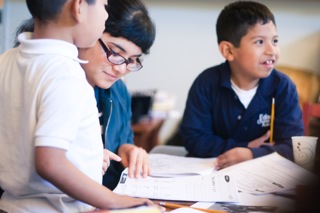

The Valencia Bay-farer is 826 Valencia's only in-house newspaper written for students by students (ages 8 to 14). Our intrepid reporters learn lessons about the various aspects of journalism, from crafting ledes to interviewing to citing sources and at the end of each five-week workshop, we release a new issue full of articles about the kinds of things you'd love to read if you were a kid. We hope you enjoy these articles. To learn more about 826 Valencia, visit our website.
Uh-Oh, More Oil Spills
By Helena Chuang, Age 9
It was the third anniversary of the Gulf of Mexico oil spill on April 20, but since then, there have still been many spills in the country. Oil spills are very dangerous for marine animals.
Catherine Lyons lived in New Orleans at the time of the Gulf oil spill.
"When the oil spill happened we thought it would stop leaking soon, but it kept spilling oil for months," she said. "The fishermen were really sad and the seafood industry was really affected. There were pictures everywhere of animals covered in oil."
According to Examiner.com, because of the Gulf oil spill, "more than 1,700 Kemps ridley sea turtles washed up dead between May 2010 and November of last year." On March 29, 2013, a two-to-three-inch gash appeared in the Pegasus pipe-line in Arkansas, which leads from Illinois to Texas, CNN reported. ExxonMobil apologized for harming marshlands and wildlife. 238 animals were found and sixty-two of them were dead on arrival. Fourteen more died, and a duck, three turtles and 125 snakes were euthanized. 205 have died as the result of the oil spill, according to Amy Hancock from THV11 News.
The Australian government has lots of information on the effect of oil spills on marine wildlife. Oil covers the animals and many of them become stickier over time. Sadly, birds and marine animals will not necessarily avoid an oil spill. To fish, oil looks like floating food, and then birds will come because they are attracted to the schools of fish and will dive straight into the oil to catch them. Plus, oil makes fur and feathers stick to the animal, and they get cold because the oil reduces or destroys their insulation and waterproof properties of their fur or feathers. Then they have a higher chance of getting hypothermia. Oil also disguises the scent that seal pups and their mothers rely on to identify each other, leading to rejection. Apex predators are in more danger because they feed on a huge variety of animals, and those animals might be covered in oil, poisoning the predator.
Cleaning animals covered in oil is a long process, according to Wikihow. Animals covered in oil are already very stressed out and human contact can worsen it. A veterinarian should take care of the animal for at least forty-eight hours before starting the cleaning process. Once the veterinarian has given permission to clean the animal, the person cleaning the animal carefully places it into a bucket of warm water and adds a tiny amount of dishwashing solution. Then they gently scrub over and over to make sure there is no more oil left. They wear protective clothing so that if the animal tries to bite them they're safe.
You can help avoid oil spills by walking and biking more and carpooling or taking public transportation to reduce our dependency on oil.
Alternatives to Fossil Fuels
By Anne Sappenfield, Age 10
As you know, global warming is a major issue currently. Fossil fuels like coal and oil are gradually heating up the earth's atmosphere, but thankfully we have better alternatives. Some of these include solar power, wind energy and algae fuel.
Solar power is one of our most popular alternatives because it is easy to install in your home, but currently scientists are placing much bigger panels in the desert. These can be up to a mile wide, and they both use the sun's energy as power and reflect heat off the earth and out of the atmosphere. Wind energy is a popular and useful source. We have the potential to produce more than needed, but have no way to store it. Because of this, huge amounts of energy that we could be using are wasted. Have you ever noticed how windy it is here? Now think if we could trap all of that power.
A lesser-known source is algae fuel. People have been growing algae in labs and have discovered that if you get the oil out of algae, you can use it instead of gasoline. Some people think that using electric cars is still dirty, but Laura Wisland, an energy analyst with Union of Concerned Scientists, says, "If you power your car with electricity from clean, renewable sources like wind or solar power, the electricity you use is virtually pollution free."
Many countries are fairly close to being completely green. For example, as of 2010, more than 47 percent of Sweden's electricity comes from renewable sources. As Wisland states, "Average temperatures are increasing throughout the year," indicating that global warming is "happening faster than we think." As you see, there is more to be done, but better options are appearing.